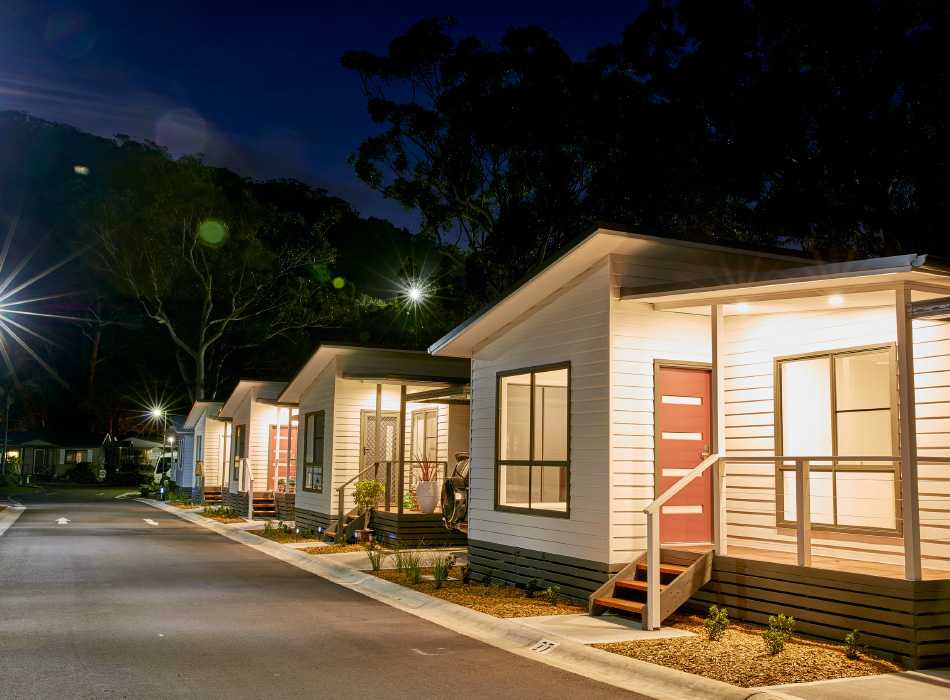How does it work?
Land lease living is growing in popularity across Australia as more and more people 50+ embrace the opportunity for an affordable and attractive retirement lifestyle.
NSW legislations QLD legislations
Before becoming a home owner in a residential land lease community there are some important items you need to consider.
It is strongly recommended that you carefully review the conditions set out in the site agreement to ensure that you are clear on all site fees and charges and that you understand the role of the community operator as well as the responsibilities that you have as a home owner.
Although the paper work associated with moving into a residential land lease community is not complex it is a good idea to seek independent legal and financial advice to review all the terms and conditions before committing to the purchase of a home and signing a site agreement.
The Residential (Land Lease) Communities Act 2013 requires a community operator to supply any prospective home owner with a Disclosure Statement that clearly sets out the terms and conditions of living in that specific community. This document should include the following:

This is the legal agreement signed between you, the home owner and the community operator. Site agreements govern all rights and obligations of both operator and resident; they must include the detailed terms and conditions applying to fees and charges, complaints processes and the grounds on which a site agreement can be terminated.
The detailed information in the Disclosure Statement is included in the site agreement. Once you sign a site agreement there is a 14-day cooling off period , which ends if you move into the home or put a home on the site in that period.
The site agreement gives you the right to live in your home on the site referred to in the agreement, which can only be terminated in some limited circumstances. Effectively, you have secure tenure protecting your investment in the home. If you die your executor becomes the home owner and the home can remain on site or be sold to remain on site.
What you pay for your site is called a site fee and is generally paid weekly or fortnightly. An operator cannot require you to pay site fees more than two weeks in advance (although you may offer to pay monthly or some other period). NSW law regulates the methods by which site fees are increased by the operator. These methods have to be clearly outlined in the site agreement.
Site fees may be increased either by:
Under This Method There Is An Up-Front Agreement About How And When The Site Fees Will Increase.
A Fixed Method May Take A Number Of Different Forms. For Example Increases In Site Fees Could Be Linked To The Consumer Price Index (CPI) Or A Percentage Of The Aged Pension, Or A Set Dollar Amount (For Example, $5 Per Year) Or A Set Percentage (For Example, 2% Per Year).
Home Owners Must Be Given At Least 14 Days’ Notice Before An Increase Takes Effect. Under The Residential (Land Lease) Act 2013 Fixed Method Increases Cannot Be Challenged Except As An Unfair Term Under The Australian Consumer Law.
Operators Using This Method To Set Price Increases Must Give At Least 60 Days’ Notice Of Any Proposed Site Fee Increases;
All Home Owners Have To Be Advised In Writing At The Same Time And Site Fees Cannot Be Increased By Notice More Than Once Per Year.
If At Least 25 Per Cent Of Home Owners In The Community, Who Received The By Notice Site Fee Increase Think That The Increase Is Excessive, Then They Can Apply To NSW Fair Trading For Mediation.
If The Mediation Is Unsuccessful, They Can Apply To The NSW Civil And Administrative Tribunal (NCAT). This Is A Specialist Body, Which Resolves A Wide Range Of Everyday Disputes Relating To Matters That Include Tenancy, Residential Communities And Leases.
NCAT Will Determine Whether The Increase Is Excessive By Considering A Range Of Factors Such As The Frequency Of Past Increases, Actual Or Projected Increases In Operating Expenses, Any Repairs And Improvements That Are Planned Or Have Been Carried Out, The Value Of Any Improvements In The Community And Whether The Increase Is Fair And Equitable To The Community.

These arrangements can be offered to prospective homeowners before they enter into a site agreement with an operator. They are essentially an arrangement by which prospective home owners can negotiate discounts on site rental fees in exchange for additional up-front fees, exit fees or by committing to share a percentage of any capital gain made on their home when they eventually sell it.
Capital gain is the difference between the price you originally pay for the home and the price you then sell it for when you choose to leave the community.
It is important to know that these arrangements are, as the name implies, voluntary. The operator must always also offer the opportunity for any prospective to enter into a standard site rental-only agreement where the resident purchases their manufactured home outright and then sells it when they leave the community without paying the operator any additional fees or percentages of the sale price.
In land lease communities utilities such water, sewerage, gas and electricity are usually already connected to your home site when you move in and you pay usage fees and service availability charges to the operator (as specified in the site agreement):
Learn More about Site Agreements before You Sign. It is always a good idea to get legal advice before entering into any sales contract for a home or arrangements for a site. You should also do your homework in learning about your rights and obligations when you enter a land lease community.